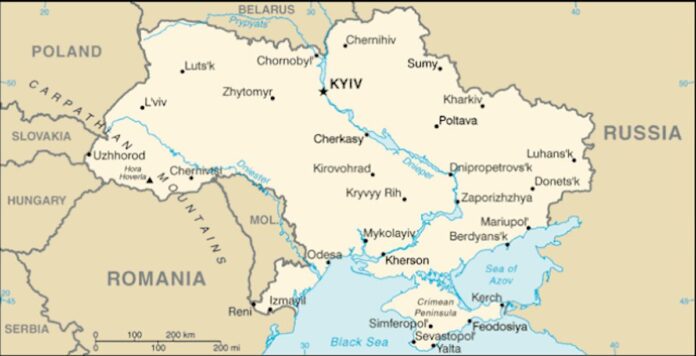The inevitable conflict, Russia and Ukraine
It seems that likely the week beginning on February 21st can be decisive for European geopolitics. The silence of the United Nations and also the Security Council’s declaration that none of its members will use nuclear weapons first are circumstances suggesting that the conflict Russia/Ukraine was already considered inevitable since several weeks ago.
Many governments have invited their fellow citizens to leave the country and have strongly reduced their diplomatic representations in Moscow. Huge quantities of armaments are transferred and are in action in Ukraine on a daily basis and there is no longer any opening for reasonable negotiations.
There are three possible scenarios in order of severity
1) The Russians advance into Eastern Ukraine and annex the Donbass, perhaps gaining formal independence first, to later integrate it completely. The human costs would be severe as Kiev’s Eastern front recently has been greatly strengthened, not to mention the possible guerrilla war after the occupation.
2) Moscow also attacks the rest of Ukraine and an open war is looming with a human cost that is difficult to calculate but it would be very high. In this case, the help that the EU and the United States should decide to give to Kiev could be considered by Moscow as a casus belli with even more serious consequences. Trade relations between Western Europe and Russia could undergo a dramatic reduction and the entire continent would be destabilized economically.
3) Putin continues to demand the withdrawal of NATO from countries contiguous to Russia. But such request is not accepted and the logic of the opposing blocs returns to determine the geopolitical map of Europe. The arms race resumes and the risks of proxy wars on the planetary plane grow enormously. The borders of the European Union are transformed into a forest of missiles in perpetual state of alarm.
What does Putin really want?
First of all, he is interested in rehabilitating Russia as a planetary superpower, after a long period of crisis in which it was forced to see some friendly countries attacked by NATO: first Serbia and then Syria. Secondly, he intends to export raw materials of which it is very rich in order to put the West’s dependence on them under everyone’s eyes.
In addition Putin tries to force the United States to face Chinese rivalry in the Far East and European military weakness in the Old Continent at the same time. In this context he acts as a bulwark in defense of the Russian-speaking minorities that were formed in the satellite countries in the Soviet era (in particular in the Baltic region).
Anyway, it is possible that, in spite of the dramatic consequences of a war, the two sides find an agreement based on which they can declare themselves satisfied, at least temporarily.
Giunge il momento della resa dei conti
Il conflitto inevitabile, Russia e Ucraina
Per varie ragioni sembra che la settimana che si apre il 21 febbraio possa essere decisiva per le geopolitica europea. Il silenzio delle Nazioni Unite e – ancora di più – la dichiarazione da parte del Consiglio di sicurezza che nessuno dei suoi componenti utilizzerà armi atomiche per primo, ci fa pensare che il conflitto fra Russia e Ucraina fosse già considerato inevitabile parecchie settimane fa.
Molti governi hanno invitato i propri concittadini a lasciare il Paese di Volodymyr Zelens’kyj. E hanno ridotto al minimo le rappresentanze diplomatiche a Mosca. Quantitativi enormi di armamenti vengono quotidianamente trasferiti e resi operativi in Ucraina e dunque non si vede più alcuno spiraglio per ragionevoli trattative.
Gli scenari possibili nel possibile conflitto in Ucraina in ordine di gravità sono tre
I russi avanzano nell’Ucraina Orientale e si annettono il Donbass. Magari ottenendone l’indipendenza formale prima, per integrarlo successivamente in maniera completa. Però con gravi costi umani a causa del forte rafforzamento del fronte orientale di Kiev avvenuto negli ultimi tempi. Senza considerare una possibile guerra partigiana dopo l’occupazione.
Oppure, Mosca attacca anche il resto dell’Ucraina e si profila una guerra aperta con un costo umano difficile da calcolare ma sicuramente altissimo. In questo caso se la Ue e gli Stati Uniti decidessero di dare un aiuto a Kiev, ciò potrebbe considerato da Mosca un casus belli. Con conseguenze ancora più gravi: le relazioni commerciali fra l’Occidente europeo e la Russia potrebbero subire una drammatica riduzione. Ma anche l’intero continente verrebbe destabilizzato economicamente.
Infine, Putin continua a richiedere la ritirata della Nato dai Paesi contigui alla Russia. La richiesta è rifiutata e la logica dei blocchi contrapposti torna a determinare la carta geopolitica dell’Europa. La corsa agli armamenti riprende e i rischi di guerre per procura sul piano planetario cresce enormemente. I confini dell’Unione europea si trasformano in una foresta di missili in perenne stato d’allarme.
Che cosa vuole veramente Putin? Il conflitto con l’Ucraina, una carta importante
In primo luogo riabilitare la Russia come superpotenza planetaria, dopo un lungo periodo di crisi che l’ha costretta a vedere alcuni Paesi amici attaccati dalla Nato: prima la Serbia e poi la Siria. Quindi giocare la carta dell’esportazione delle materie prime di cui è ricchissima per mettere sotto gli occhi di tutti la dipendenza dell’Occidente da esse.
In secondo luogo costringere gli Usa a fronteggiare contemporaneamente la rivalità cinese, in Estremo Oriente, e la debolezza militare europea nel Vecchio Continente. E, in questo contesto, presentarsi come baluardo a difesa delle minoranze russofone che in epoca sovietica si erano costituite nei Paesi satelliti (in particolare nella regione baltica).
Ciò detto, nulla esclude che di fronte alle drammatiche conseguenze di una guerra le due parti trovino un accordo in base al quale possano dichiararsi soddisfatti, almeno momentaneamente.








